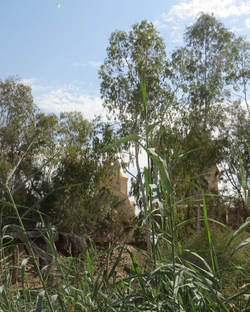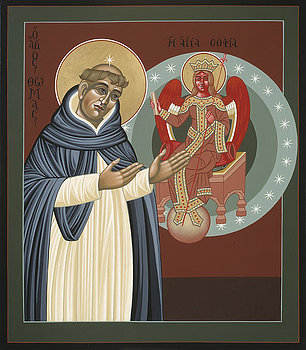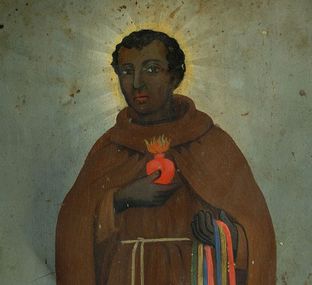 “Seek and you will find.” Even if not overly familiar with naming chapter and verse, many know this statement is from the Sermon on the Mount, one of the most well-known sections in the New Testament. (Matthew chapters 5-7; the exact verse quoted is Matt 7:7.) This Sermon is the centerpiece of Jesus’ teaching because in it He outlines the way we are to live if we want to be His followers. Basically Jesus tells us that the Mosaic Law was always meant to be an instrument of love and so consequently we should see the gospel as governed, so to speak, by the law of love; He also tells us that because love is the way of our lives, we should treat others as we want to be treated and that we should not judge others by any kind of yardstick since things are not always what they seem to be. The way of this seeking and finding, the way to know how to apply the law of love, is to seek wisdom so that we can see in a new way, perhaps a bit more as God sees. To see this way and to have the wisdom which Jesus teaches is to learn how to discern that which leads us closer to God and therefore to choose it, rather than that which leads us away from God, and therefore needs to be avoided. It is not always easy, but we do have guides who show us how to seek and find: the Saints teach us that we need to pray for the gifts of wisdom and discernment, and that we can in fact, attain them. To be wise, is surely to be holy.  Jesus began the Sermon on the Mount with the Beatitudes (Matthew 5:3-10) and each one begins with the same phrase: “Blessed are the poor in spirit…blessed are they who mourn…blessed are the meek….” The word ‘blessed’ was considered synonymous with being holy, happy, or wise. This meaning came from the tradition of Jewish wisdom literature prevalent in the centuries just prior to the time of Jesus. Jesus would have been very familiar with this tradition; therefore He intentionally taught this wisdom as a pathway of love which leads one close to God. Just as in the Wisdom Books of the Old Testament, Jesus indicated that the wise one is the holy one. (Re-read the Beatitudes substituting the word wise for blessed.) Spiritual wisdom, therefore, is what the follower of Jesus seeks to obtain; that is, the disciple of Jesus seeks holiness. In the (Old Testament) Book of Wisdom the writer makes it clear that wisdom is not something one learns in a classroom or by obtaining knowledge, but that it comes from seeking after the ways of God through prayer. The author realizes that to have wisdom we must behave the way God does, with mercy and love. Indeed the most beautiful part of the Book of Wisdom comes when the author shows how God’s mercy is connected with wisdom when he writes, “But you have mercy on all, because you can do all things; and you overlook sins for the sake of repentance. For you love all things that are and loathe nothing that you have made.” (Wisdom 11:23-24; but do read all of it from 11:23-12:1.) That Jesus continued to emphasize this message of mercy and love is evidence that this is important to our growth in holiness. The wise one is the holy one, and the holy one is the one who shows mercy and love.  In the history of the Church there have been many brilliant Saints who were theologians and philosophers, now known as Doctors of the Church, such as Augustine, Thomas Aquinas, and Bonaventure. These men certainly had knowledge and wisdom. In other words, they were outstanding academics with brilliant intellects, but they were also holy, living with discernment the love and mercy which comes from a life steeped in the gospels. Another outstanding Doctor of the Church was St. Hildegard of Bingen (1098-1179) who was not only incredibly knowledgeable, but had the true wisdom which comes with holiness. Hildegard was a mystic, but she also understood ecology, medicine and the ways the human body works, what we would call engineering, (creating a system of indoor plumbing), music, (writing the world’s first opera), and theology. Most of what she knew came through her mystical experiences and gifts from the Holy Spirit, but she was also known for being a woman of mercy and compassion. She possessed spiritual wisdom, the insights of which led her to intellectual understanding, but which also enabled her to grow in discernment, charity, and love. I suspect that if one were able to ask her what was more important to her, the intellect or the wisdom which comes from God, she would not hesitate to say that intellect pales in comparison to that which comes from God.  Another wise saint (someone many are unfamiliar with, but should know) was known as St. Benedict the Moor (1526-89). To be clear, ‘the Moor’ is actually a misnomer: he was not a Moor since the Moors were descendants of Arabs and Spaniards and he was descended from neither of these. In truth, Benedict was nicknamed ‘il Moro’ which in Italian means ‘the Black.’ Benedict and his parents came from Africa, taken to Sicily as slaves, and therefore he was a man of color. Somehow over the years ‘il Moro’ was mistranslated ‘the Moor’ when in reality he is St. Benedict the Black. It is an important distinction; to truly understand the circumstances of his life and how remarkable he truly was, it is essential to know his true origins. Born into slavery, Benedict was given his freedom when he was 18, becoming a day laborer due to his lack of education. He was ridiculed for being generous to the poor, but he remained unperturbed by this, ministering to the sick and sharing what little he had. At 21 he entered the Franciscans in Palermo, spending the first part of his ministry as a lay worker in the kitchen. But after the head of the friary died, this simple man who could neither read nor write was chosen to be the new leader. He was said to have possessed divinely-given knowledge of the Scriptures and of deep theological truths, “which astounded learned men and aided him in the direction of souls.” * St. Benedict was generous to the poor throughout his entire life and miracles were reported through his intercession. It was said that at times his faced glowed radiantly, especially when he was at prayer. Toward the end of his life he willingly returned to his humble position in the kitchen, dying at the hour he said he would, having lived a life of service, mercy, compassion, and spiritual wisdom. This is a man who truly lived the gospel, even though he could not read a word.  St. Benedict the Black teaches us that wisdom is not something that is elusive and it is not something which is only for ‘elite minds.’ However, he also shows us that the wisdom of God is not at all the same as the wisdom of the world. The world will mock and ridicule, even attack us, for trying to live the wisdom of God through a life of holiness. But the wisdom of God is that which ultimately brings healing and wholeness, and it is the message of the Gospel. It is not the easier path, and in fact, it can be quite challenging to stay the course. But it is not a path we travel without assistance. Jesus assured us of this when He said: “Seek first the kingdom of God and his righteousness, and all these things will be given you besides.” (Matthew 6:33) In other words, if we want to grow in holiness we are to seek that which is of God, and in seeking it, we will find it. If we want to be holy we need to pray, acquainting ourselves intimately with Jesus. His way of love must become ours; His way of seeing the world, His way of forgiveness, compassion, mercy, generosity, kindness, justice, and peace must find a home in our heart if we are to become wise. Anything which leads us to God and not to self, anything which leads us to love, embraced as our way of life, will render us wise. The wise one seeks and will find, but that one will not stop there. The wise one, in finding, will share. That is the way of love and that is the way of Jesus. True wisdom is to seek in prayer, to find in one’s heart the Word who takes up residence there, and to share the wealth of love, mercy, and compassion with a world desperately in need. Let us be like St. Benedict the Black, humbly bringing the wisdom of Jesus in word and deed to those who do not know Him, bringing comfort to the suffering, and joy to the lonely.  May we seek the path of love that we might find true wisdom! May we ask for the intercession of St. Benedict the Black to help us seek only that which brings healing, light, truth, and life and to reject all that moves us away from these things! May we have the courage to live the life of wisdom as taught by Jesus, relying on God’s mercy and grace to persevere! May we share what we have with others, both from our goods and from the wisdom we possess in the Gospels! And may we in seeking, find, and in finding, share the great love, mercy, and compassion of Jesus! Let us meet in the Heart of our Lord Jesus! Peace! ©Michele L. Catanese * The quote is from an excellent article on St. Benedict the Black found at http://www.roman-catholic-saints.com/st-benedict-the-moor.html. Another good resource is found at http://catholicsaints.info/saint-benedict-the-black/. Note: The next post will be on August 28. Images: 1. This is a photo I took in Maine at the Cape Elizabeth Lighthouse. I chose this for the beginning of the post because lighthouses are often symbolic of seeking and finding since they are meant to safely guide mariners to the ports that they seek. 2. This is a photo of a church almost hidden in the reeds from a vantage point at the Jordan River in Israel. I took this picture with the intention of the church being seen obscurely and therefore I chose it here for the same reason: it takes a bit of effort to seek and find. Quite often what we seek appears gradually, but it is worth the effort. 3. This icon is called The Silence of St. Thomas Aquinas by Fr. William Hart McNichols. I chose to use it here because it completely captures the point I was making about some of the brilliant theologian saints. St. Thomas was more than a brilliant thinker; he was a mystic and a holy man. In this icon he is seen contemplating holy wisdom which he finds in the profound silence of prayer. He could not have lived the holy life he did, nor could he have written a word, without obtaining spiritual wisdom. This icon can be found at https://fineartamerica.com/featured/the-silence-of-st-thomas-aquinas-097-william-hart-mcnichols.html. 4. This painting of St. Benedict the Black is from Mexico. I chose it because it shows the Saint in great simplicity, dressed in his Franciscan robes, his face aglow with the love of God. I love that his heart is in his hand, as if he is about to offer it to the viewer. It reminds me of the Sacred Heart of Jesus and perhaps the artist meant for us to realize the Benedict's heart had become one with the heart of Christ. It is an absolutely stunning painting which captures the true essence of this great Saint as well as the connection between wisdom and love. 5. This is another of my photos, taken in Fort Davis National Park in Fort Davis, TX. I chose it here because it shows a vista which would be a difficult path for one to try to cross. 6. This final image is one of seven paintings of the same subject done by Vincent van Gogh, one of his Sunflowers series. I chose this particular one because of his predominant usage of shades of yellow. It seems to capture light and life, especially if you look closely and notice the texture that he used in some of the flowers. By adding texture he has made these sunflowers burst with life. Comments are closed.
|
Heart Speaks to Heart
|

 RSS Feed
RSS Feed

